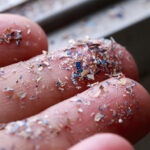STARTLING discovery: Researchers detect microplastics in human hearts
 (NaturalHealth365) In a truly unsettling revelation, recent reports have shed light on a concerning fact: the average person unwittingly ingests a weekly serving of microplastics equivalent to a whole credit card. Yes, you read that right – it’s like swallowing a mini credit card every week, weighing around five grams. But here’s the kicker: some of these pesky microplastics don’t simply pass through our bodies as expected; they decide to stick around.
(NaturalHealth365) In a truly unsettling revelation, recent reports have shed light on a concerning fact: the average person unwittingly ingests a weekly serving of microplastics equivalent to a whole credit card. Yes, you read that right – it’s like swallowing a mini credit card every week, weighing around five grams. But here’s the kicker: some of these pesky microplastics don’t simply pass through our bodies as expected; they decide to stick around.
As if that weren’t distressing enough, researchers have uncovered an even more troubling truth – microplastics have made their way into the very chambers of our hearts.
Shocking findings from medical research: Microplastics infiltrating the heart
The recent report highlighting how microplastics have made their way into heart tissue was made after analyzing patients before and after heart surgery. While there’s a hint of a possibility that some microplastics might find their way into heart tissue during medical procedures, the prevailing evidence suggests a more unsettling truth – it’s our consumer-driven world that’s primarily responsible for this intrusion.
These tiny microplastics navigate their way into the heart through body openings like the nose and mouth. And while it’s plausible that other organs might also host these minuscule invaders, the fact that they’re making their home in the heart is particularly worrisome. After all, the heart is the symbolic engine that keeps our body running smoothly.
Thousands of microplastic pieces found in human heart tissues and blood samples
This unsettling discovery unfolded through meticulous research conducted by a team from Beijing’s Capital Medical University. During surgeries, they collected tissue samples from patients’ hearts and gathered blood samples before and after these medical procedures. They employed a cutting-edge technique called laser direct infrared imaging to unveil the hidden truth.
Under this microscopic scrutiny, the researchers found tiny particles, measuring between 20 and 500 micrometers, lurking within the patients’ hearts. These microplastics comprised over half a dozen distinct types of plastics, ranging from polymethyl methacrylate to polyvinyl chloride. What’s particularly concerning is that the presence of polymethyl methacrylate couldn’t be attributed to accidental exposure during surgery.
Discover a Simple and Effective Way to Remove Toxins: This is Jonathan's #1 choice for at-home detoxification. Special offer ends Feb. 16.
Even more disconcerting, the majority of the collected samples contained tens of thousands of these minuscule microplastic pieces. To compound the issue, the patients’ blood samples were also found to be teeming with microplastics. However, it’s important to note that some tissue samples remained untouched by these intruders, hinting at the possibility of a healthy heart free from microplastics.
Tips to avoid microplastic consumption
While the full extent of harm caused by microplastics in the human body remains uncertain, the prevailing belief is that these tiny particles could have lasting and impactful consequences.
Contrary to common belief, microplastics are not limited to oceans and water bodies; they have become ubiquitous. While eliminating them entirely is impossible, you can make a difference by reducing your plastic consumption. Opt for glass bottle refills over disposable plastic water bottles.
To further safeguard against exposure, limit your consumption of certain seafood, including bivalves and bottom feeders like crabs or crayfish, which tend to bioaccumulate more unwanted substances. Also, avoid microwaving food or beverages in plastic containers, as this can release even more microparticles.
Taking preventive measures such as dusting and vacuuming with a HEPA filter can curtail microplastic circulation indoors, minimizing inhalation risk.
Sources for this article include:



